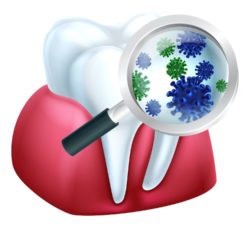Gum disease refers to a bacterial infection in the gum tissue. It can begin with inflammation of the gums, but as it progresses, bacteria can eat away at the teeth and jawbone to create irreversible dental damage.
This disease is common, affecting about half of American adults. You can help balance oral bacteria and prevent gum disease by practicing good oral hygiene. However, even with these preventative efforts, some dental patients could hold a greater risk of this issue than others. Read on to find three factors that may increase your likelihood of contracting gum disease.

What Heightens My Risk for Gum Disease?
Aggressive Oral Bacteria
Though you practice good and thorough oral hygiene at home, which will prevent plaque from spreading bacteria to infect your gums, you might still be susceptible to contracting gum disease. It can occur due to factors beyond your control, including genetic predispositions.
Your mouth naturally contains bacteria, but sometimes you can develop particularly aggressive bacteria. The cause of this is unclear, but the consequences can be destructive of bone and tissue and other unpleasant symptoms.
If this occurs, oral hygiene alone will not be enough to protect your smile. Your dentist can form an individualized preventative care plan for your unique needs. They might suggest an antibacterial rinse that can help balance your oral bacteria to decrease the likelihood of it spreading to hurt your smile.
Underlying Medical Issues
Factors like age and certain medications can influence your gum health too. Adults over the age of 65 can see a 70% increase in their risk of contracting gum disease, according to the American Academy of Periodontology.
But underlying medical conditions can affect your gums as well. Heart disease, arthritis, and diabetes can create inflammation throughout the body, which will link and worsen inflammation within the gums caused by infection.
Changes within the body, such as fluctuating hormones or pregnancy, will also make your gums more prone to infection. If you have health concerns, your dentist can help you pay close attention to your periodontal care.
Poor Oral Habits
Your lifestyle and chronic habits can affect your oral health, especially your gums. Smoking can create many health problems. But tobacco usage slows tissue healing within the mouth, which will put your gums at risk of infection.
Your diet will also affect your gum health. Make sure you eat nutritious foods with plenty of Vitamin C to improve your immune system and your body’s ability to fight infections like gum disease.
Even if you practice oral hygiene as often as you should, your gums could still be in danger if you do not use proper brushing and flossing techniques. Do not rush your oral hygiene regimen and use purposeful and thorough movements when you clean your smile.
Lingering food particles and plaque will encourage bacteria to spread and hurt your gums. For optimal preventative care, visit your dentist for regular teeth cleaning appointments too.
